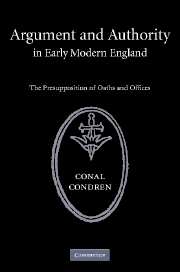Book contents
- Frontmatter
- Contents
- Preface
- Introduction
- Part I The liquid empire of office
- 1 An overview
- 2 Ceremonies of office: The kiss of the tutti-man
- 3 Institutionalised office: a sense of the scavenger
- 4 The vocabulary of office
- 5 Offices of the intellect: player, poet and philosopher
- 6 Soul and conscience
- Part II The authority and insolence of office
- Part III ‘I, A. B.’
- Epilogue
- Bibliography
- Index
6 - Soul and conscience
from Part I - The liquid empire of office
Published online by Cambridge University Press: 28 October 2009
- Frontmatter
- Contents
- Preface
- Introduction
- Part I The liquid empire of office
- 1 An overview
- 2 Ceremonies of office: The kiss of the tutti-man
- 3 Institutionalised office: a sense of the scavenger
- 4 The vocabulary of office
- 5 Offices of the intellect: player, poet and philosopher
- 6 Soul and conscience
- Part II The authority and insolence of office
- Part III ‘I, A. B.’
- Epilogue
- Bibliography
- Index
Summary
For my Soul, I confess I have heard very much of Souls, but what they are, or whom they are for, God knows.
(Nathaniel Brent, The Last Will and Testament of the Earl of Pembroke, 1681)One sympathises: it was hard not to hear much of souls in seventeenth-century England, but what they were was indeed debatable. Since antiquity, the soul (psyche) could refer both to the moving principle inherent in all living things and to the conjunction of will and intellect in humans, usually considered immortal. This chapter is mainly concerned with the second, intellective understanding of the soul, but initially it is important to disengage what were often confusing patterns of meaning.
Plato had used psyche in both senses in the Timaeus, a somewhat Pythagorean dialogue that became a touchstone in Renaissance discussions. To these he added the notion of a world soul to explain the apparent coherence of creation itself. Aristotle's De anima provided seminal material for scholasticism and Reformation theology, but it seemed to have no use for a world soul, while from Epicurus and Lucretius came a notion of a material soul, the intellective soul conceived as mortal and composed of atoms. Varieties of Stoicism qualified and continued to mix theories of the psyche as principle of life, divine spark of humanity, with the psyche tou pantos, or world soul.
- Type
- Chapter
- Information
- Argument and Authority in Early Modern EnglandThe Presupposition of Oaths and Offices, pp. 125 - 146Publisher: Cambridge University PressPrint publication year: 2006

